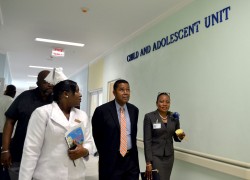
Despite its campaign promise to implement National Health Insurance (NHI) within the first year of assuming office, the Christie administration will not be able to deliver on that vow if the economy doesn’t recover, according to a top cabinet minister.
When asked when the health insurance scheme would come on stream Health Minister Dr. Perry Gomez admitted that the government doesn’t have a set date for the plan to begin.
“We have to wait until the circumstances are right in terms of the level of unemployment comes down because it is a paying scheme and it involves everybody participating,” Dr. Gomez said yesterday.
The Bahamas’ unemployment rate currently hovers at 15.9 per cent, according to the latest figures from the Department of Statistics.
When the NHI scheme comes on stream it will require the full participation of all employers and their employees who will have to pay to enjoy the government-introduced benefit.
NHI is a form of social health insurance, which uses the principles of fund pooling and risk sharing to provide equity in access to care.
Government officials say individuals will pay an “affordable” amount on a consistent basis and in return will be able to have their healthcare needs provided for, regardless of cost.
It is envisioned that this ‘cradle to the grave’ national healthcare coverage will cover persons who are currently excluded from private insurance plans such as individuals with pre-existing illnesses, newborn babies and those over 65.
According to the health minister, the level of contributions from Bahamian workers will depend on their yearly salary.
“The contribution to National Health Insurance is funded by everybody like how you pay National Insurance,” he told reporters Wednesday.
“The difference is that it is funded on a percentage of your income and your income in the proposal that we wrote is an income up to $60,000 per annum and it would be a small percentage like three to four per cent towards National Health Insurance. That’s the way the contributions to NHI will be garnered and that’s what makes it equitable.”
But Dr. Gomez said NHI will be separate from National Insurance Board (NIB) contributions.
During his budget communications recently, Prime Minister Perry Christie promised that there would be no new taxes introduced this fiscal year.
And when asked if NHI contradicts the prime minister’s promise, Dr. Gomez insisted that NHI is not a tax.
“It’s a benefit more than a tax. Some people may argue that it is a tax, but you get a benefit. Usually when you are taxed, there isn’t a benefit. The cost for the government is going to be for those people who are not employed, who cannot work like the elderly and so on. The government will pay their premium,” the minister said.
As for the National Prescription Drug Plan, which allows children, public servants and the elderly to receive medicine for chronic illnesses under any participating pharmacy, Dr. Gomez said that will go under NHI.
“NHI is a comprehensive medical programme with comprehensive benefits and that includes drugs,” he said. “That should be embodied in NHI. There’s no tampering with the prescription plan for the time being. The prescription drug plan is only different from what previously existed insofar as you can use private pharmacies.”
He continued, “Free drugs are not new to The Bahamas. Patients could have had free drugs from time immemorial.
NHI legislation was crafted under the former Christie administration.
At the time, many Bahamians argued that The Bahamas could not afford the mandatory plan.


